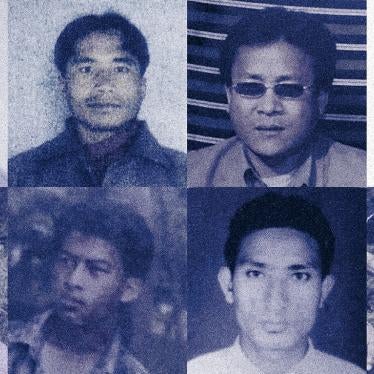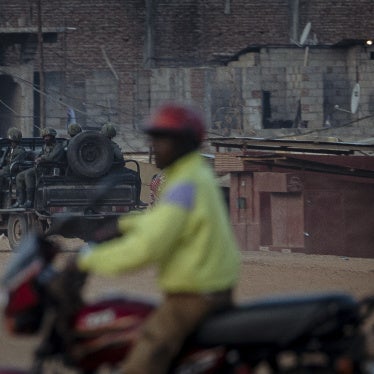(New York) – The Cambodian government should drop plans to revive a discredited draft law that severely restricts the activities of nongovernmental organizations and associations, Human Rights Watch said today. The government has indicated that it plans to adopt a new law in May 2015, with Prime Minister Hun Sen saying he would use it to “handcuff” groups that did not comply.
The government should immediately make the draft Law on Associations and Nongovernmental Organizations (LANGO) public and engage in an open consultation process with nongovernmental groups. Cambodia’s donors should inform the government that they will reject attempts to arbitrarily de-register organizations or otherwise curb basic freedoms to association and expression.
“Nongovernmental groups in Cambodia have long played a crucial role in providing essential services to the public and holding the government accountable,” said Brad Adams, Asia director. “But the threat to ‘handcuff’ those who oppose this law shows an intent to clamp down on groups that criticize human rights abuses, corruption, and other government misdeeds.”
On April 5, 2015, Hun Sen announced that the draft law had been “completely” and “permanently” finalized in secret by the government in 2012. In speeches on April 1 and 5, 2015, he said that organizations were currently operating “outside the law” and doing “whatever they please,” including supporting the political opposition and “cursing” the ruling party. They could criticize the draft law but that would not prevent the National Assembly from adopting it by the end of May, he said. Hun Sen alleged that some organizations were simply making up stories of human rights violations to attract funding. Groups that did not register under the new law would be “handcuffed,” he said.
The ruling Cambodian People’s Party (CPP) has proposed laws restricting the activities of associations and nongovernmental organizations on many occasions in the past 20 years. The most recent attempt, during 2010-12, involved four successive draft laws that Cambodian groups and international donors vigorously opposed. While there were some improvements in successive texts, the government never removed the vague and overbroad language that would have allowed it to act arbitrarily against disfavored organizations.
The fourth draft contained vague and unspecified terms that would have enabled the government to close or deny registration to targeted groups. It also contained unnecessary barriers to the registration and operations of international organizations and burdensome requirements compelling community-based groups to notify local authorities about their planned activities. In December 2011, Hun Sen said the fourth draft would be temporarily shelved, but that regardless of disagreements with its contents, the law would be revived.
No additional laws regulating associations and other nongovernmental groups are needed beyond existing legal provisions. For example, the Cambodian Civil Code provides details on registration and dissolution of nonprofit legal entities, the right to appeal government decisions about such matters, and workable registration requirements. The Penal Code and Anti-Corruption Law address fraud, while international organizations can obtain legal standing through Memoranda of Understanding with the government.
The government’s secrecy about the contents of the draft law is just the latest example of its disregard for international standards for transparency in the legislative process. The United Nations Human Rights Committee, on April 2, 2015, criticized the lack of transparency and urged the government to make public all draft legislation “to facilitate public debate and dialogue by citizens with their representatives” in parliamentary institutions.
“While Hun Sen claims that he has adopted a new ‘culture of dialogue,’ he has not even been willing to release the draft law so there can be a public debate,” Adams said. “Instead, he has resorted to threats to ram through a law that appears to be aimed at silencing and intimidating critical voices.”
Governments have a legitimate regulatory interest in providing benefits to organizations that become legal entities and preventing criminal activity. But such regulations cannot be used as a cover to undermine rights to freedom of association, expression, and assembly, which are protected under the Cambodian constitution and international treaties to which Cambodia is a party.
“Hun Sen’s arguments for quickly passing a new NGO law are specious and a cover for silencing critical voices,” Adams said. “Hun Sen’s past attempts to squelch organizations with draconian laws were blocked by concerted efforts from donors and independent groups. They will quickly need to find their voices to ensure that the country’s thriving nongovernmental sector, one of the most important achievements of the past 20 years, is not put at risk.”








